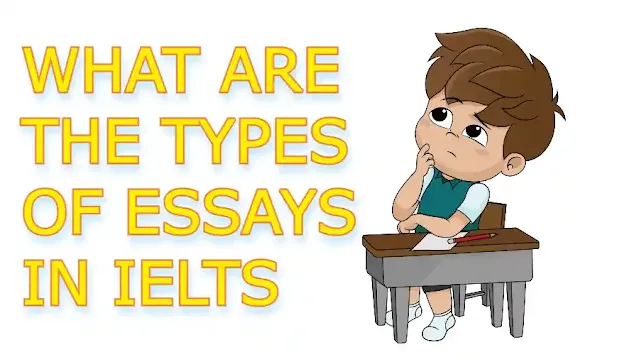What are the Types of Essays in IELTS?
International English Language Testing System, IELTS, is a standardized test that is specially designed to assess the language ability of those who wish to study or work in an English-speaking country.
Furthermore, IELTS is divided into two varying parts, such as the Academic IELTS and the General Training IELTS. While the former is for college or university admission, the latter is for immigration and career purposes.
And then, IELTS has four modules, viz. Speaking, Writing, Listening and Reading. While all of them are important, the writing section evaluates your grammatical prowess and the flow of your thoughts. Therefore, you will have to attempt varying IELTS essay topics to master your Writing skill. Let’s have a look at the types of essays in IELTS as mentioned below.
The Purpose of Essay Writing
The primary purpose of essay writing is to understand whether the candidate is adept at:
Writing skills
Vocabulary
Grammar
Reasoning capabilities
Expression of ideas.
Your ability to respond will be assessed on the basis of how you respond by:
Justifying your opinion
Summarizing details
Discussing the topic
Outlining problems
Discovering possible solutions
Supporting your reasons, arguments as well as relevant examples
In the essays, you will have to:
Write down general pertinent information as per the given topic
Provide relevant reasons for a problem
Outline the causes of a problem and write solutions for it as well
Justify your opinion
Assess evidence along with the ideas
Evaluate to what extent you agree or disagree with the given statement or the idea
Decide if there are advantages or disadvantages
Types of Essays in IELTS
Listed down below are some of the common types of essays that you can find in IELTS:
Opinion Essay
Also known as argumentative or agree disagree essay, these are the common types of essays. The question’s first part will be a statement. And then, you will have to give your own opinion pertaining to the statement. You will have to select one side of the argument and state the opinion in the introduction. Then, you will have to keep the same opinion in the entire essay and give reasons for why you think so. Some of the typical words that will be used to ask the question are:
To what extent do you agree or disagree?
Is it a positive or negative development?
Do you agree or disagree?
Here is the essay structure:
Discussion Essays
In this essay type, you will have to discuss both sides of the argument. The easiest way to write this article is to select one perception to agree with and one to disagree with. You will have to develop both sides of the argument in two separate paragraphs. Some of the examples of discussion essays include:
Discuss both views and give your opinion.
Discuss both these views and then give your own opinion.
Discuss both sides of this argument and give your own opinion.
Also, it is recommended to write about the disagreed view first. Here is the essay structure:
Problem Essay
Also known as problems and solutions essays or causes and solutions essays, the question of a problem essay begins with a statement. And then, you will have to discuss the problems or causes and the solutions.
Here are some of the examples of how these questions would look like:
Overpopulation of urban areas has led to numerous problems. Identify one or two serious ones and suggest ways that governments and individuals can tackle these problems.
The internet has transformed the way information is shared and consumed, but it has also created problems that did not exist before. What are the most serious problems associated with the internet and what solutions can you suggest?
In the developed world, average life expectancy is increasing. What problems will this cause for individuals and society? Suggest some measures that could be taken to reduce the impact of ageing populations.
A common mistake that most people end up committing is not linking the problems and causes together. Make sure you write them in detail and retain the flow. Here is the structure:
Advantages & Disadvantages Essays
For this type of essay, the first part of the question is going to be a statement. You will have to write both the advantages as well as disadvantages of the given idea. Some of the typical words to describe the question are:
Discuss the advantages and disadvantages and give your opinion.
What are the advantages and disadvantages of….?
Do you think the advantages outweigh the disadvantages?
Jotted down below is the basic structure of this essay:
Direct/Double Question Essays
Last but not the least, this type of essay is also known as two-part questions or direct questions essay. It comes with one statement and two varying questions after it. It is possible that the two questions might be or might not be linked. Some examples are:
Companies use a variety of methods to improve the sales of their products. What are those methods? Which is the most effective method?
These days people pay more attention to famous film stars than to famous scientists. Why is this happening? Explain the trend, giving reasons and examples to support your opinion.
Wealth and material belongings often measure the success that a person has. Do you think wealth is the best measure of success? What makes a successful person?
Also, make sure that you are answering both questions completely. Here is the structure to follow:
In Conclusion
Now that you have a brief idea of the types of essays in IELTS, it will be much easier to plan your answers accordingly. While studying the essays, make sure you follow the given structure of the essays accordingly. If you are still confused and require professional help, you can seek assistance from online IELTS coaching centres, such as IELTSMaterial.com
Also read: Study Any Time and Anywhere with IELTS Online Coaching
THANK YOU SO MUCH

Comments
Post a Comment